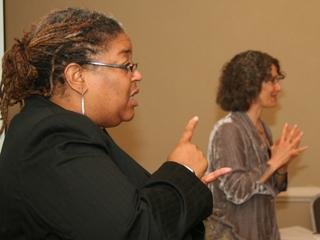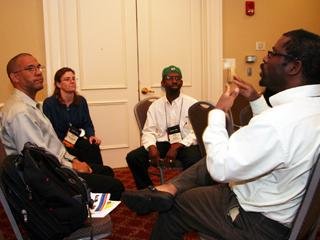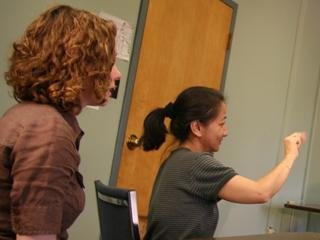Home
HomeFind an ASL-English Interpreting program
- Home
- Find an ASL-English Interpreting program

Associate Degree or Bachelors Degree?
If you’re looking for an undergraduate program, you’ll want to choose one that positions you best to move toward national certification, which now requires that you to have a Bachelors degree. There are approximately 44 Bachelors degree programs across the country. The rest are mostly Associate degree programs plus a few Masters and PhD programs. But keep in mind…not all Associate degree programs are alike. Look for a program that has a transition plan in place to move students from the Associates to the Bachelors degree level. Often this means that the Associate degree program has an articulation agreement with a four-year institution.
Breadth of Knowledge
Interpreters need breadth and depth in world knowledge. You’ll want to find a program that offers a strong liberal arts education in addition to language, culture, and skills related to interpreting.
Already have a Bachelors Degree?
You can find interpreting certificate programs designed for students who already have a Bachelors degree. The certificate demonstrates that you’ve completed required coursework in interpreting. You can check with the programs you’re considering to see if this is an option. There is a growing number of graduate degree programs in interpreting.

Interpreting Instruction
A strong program will have faculty who are both skilled teachers and active interpreting practitioners able to bring the real world into your classroom. Look for a program whose teachers are themselves life-long learners and who are involved in their professional organization, the Conference of Interpreter Trainers.
The Commission on Collegiate Interpreter Education (CCIE) was established as the national accrediting body for interpreter education programs. A list of accredited programs may be found at
I became involved with Deaf people at a very early age. I have an older sister with a hearing loss. She didn’t use sign language. That’s the primary reason I became involved with the Deaf Community. Although, I remember thinking about taking a sign language class and I looked in and it was a room full of girls. I had to take the sign language class! I also grew up in a community where Spanish was used a lot. So I had exposure to a second language. Those are some of the reasons I learned sign language and became involved in the Deaf Community.

Myron Yoder
fell into interpreting for surprising reasons

Practical Experience
Make sure the program you choose gives you opportunities to observe interpreting and work in the field under supervision. Most programs will offer courses called “Practicum” or “Internship.” The best programs will provide experiences in a variety of community settings with highly skilled, certified interpreters to supervise your work.
- Home
- Find an ASL-English Interpreting program
© 2018 Home